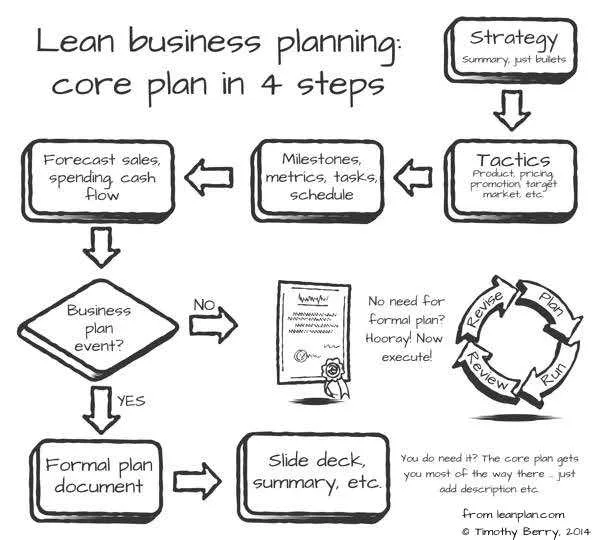Every business owner should be aware of lean business planning. It's a perfect compromise between the old-fashioned formal business plan that is too big and static, and the kind of small steps and analysis that is the watchword of lean manufacturing and lean startups. It's all about taking small steps and evaluating results often. And planning, for real businesses, isn't about the big plan; it's about the management it causes.
Why Lean Planning? What are the Benefits?
Why would you, as a business owner, care about planning? I hope that's an obvious answer, related to focus, priorities, and getting things done. Planning, done right, is about managing your business better. Set expectations, track results, and manage the difference between what you expected and what happened.
You know you can't do everything. Every business owner knows that; so we use planning to try to do the most important things. The secret to failure is trying to please everybody, so you don't try. You please the people who matter most, depending on what you want from the business. And that kind of focus is essentially strategy.
Good lean planning helps you lay out a map, or a route, or a series of steps to follow to make strategy real. Most people are more likely to get things done when they can work towards the next step, or milestone. And these are also called tactics, to execute strategy. Tactics are what you do with the actual day to day, decisions you make on optimal pricing, channels marketing, and product (or service) developments.
Regular review, another part of the planning process, helps you make sure you are actually executing your tactics by tracking progress towards your specific milestones, and watching the main performance measurements you set with your plan. Track results and compare them to expectations. Develop accountability.
Good planning helps you manage your money. You have the tools to regularly compare what you expected to sell to actual sales, and then you use that data to inform what to spend, and to ensure you never run out of cash.
That's how lean business planning is a business process that will help you manage your business. Run your business to make your life better. Don't run your life to make your business better.
First Step: A Lean Business Plan
The lean business planning method is about taking small steps, consistent tracking, and frequent course corrections. The lean plan itself only includes what adds value to management, without waste. The plan itself is lean, small, streamlined for internal use only, just big enough for optimizing the business. A lean business plan has four essential parts:
- A bare-bones description of strategy for management use only. It's probably just bullet points, not an elaborate text. It's a reminder for the team.
- Another bare-bones description of the important tactics; again, for management use only. The play defines tactics you take to execute strategy, such as pricing, marketing, product or service development, financing, and so forth.
- A measurable and trackable schedule for regular monthly reviews, plus assumptions, milestones, tasks, and the numbers and performance indicators you want to track. Milestones can include dates, deadlines, number of customers, and budgets. Tasks can include responsibility assignments and budgets.
- Essential forecasts including sales, spending, and cash flow.

This lean business plan is clearly not the “elaborate business plan” that lean startup experts reject. Unlike the old-fashioned formal business plan, the lean plan skips the carefully worded summaries and detailed business information for outsiders. The lean business plan is not even a document. It's a collection of lists, tables, and bullet points.


